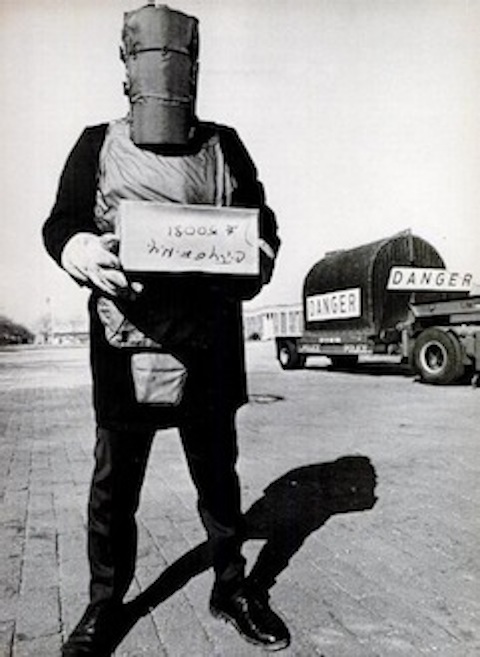
One thing my book research has taught me is that America used to have a serious problem with bombs. Every time I delve into the news archives from the early 1970s, I come away amazed at number of stories involving homemade explosive devices going off a nightclubs, bus depots, and Mafia social clubs. And I’m equally floored by the major cojones exhibited by the bomb-disposal experts who handled unexploded ordnance in that era, mostly because they operated with the most rudimentary of armor.
Though Kevlar was invented in the mid-1960s, it didn’t became a standard component of armor until much later. Bomb squad members in the early 1970s thus had to make do with the get-ups you see above, which consisted of material no tougher than the standard military flak jacket. Note the shoes, in particular; bomb shrapnel is a great threat to the most distant human extremities, yet members of the New York City Police Department’s explosives disposal squad did their dirty work in wingtips. (To their credit, though, the armor’s designers installed a flap to protect the privates, another area frequently damaged by flying debris.)
This 1973 Navy study (PDF) actually vouches for the effectiveness of the armor, though you have to read closely to understand the important caveat: the armor only really worked when combined with a blast shield. Yet in reading contemporary accounts of early 1970s’ bomb-disposal work, I have rarely come across descriptions of such shields; it seems the cops of that era liked to roll the dice.
Since then, of course, great thought has gone into developing the massive suits or armor that we’re all familiar with today. The first great advance came in 1976, with this “personal blast protection armor.” And the equipment has only gotten bulkier from there.
Tough to move around in, sure. But vastly preferable to the options in the early 1970s—or, for that matter, in 1922.


scottstev // Dec 1, 2011 at 11:04 am
Beaufort has a great scene showing the, erm limitations of current bomb-squad equipment.
Aside from the Weathermen accidental detonation, I hadn’t realized how wide-spread bombing was in that era. If only all the authors of the Port Huron Statement – compromised second draft or not- were as mellow as The Dude.
Brendan I. Koerner // Dec 1, 2011 at 12:04 pm
@scottstev: I was surprised by the prevalence of bombings in that era, too. I think what eventually ended it was a federal crackdown–the DoJ took on those cases whenever possible, often folding them into conspiracy prosecutions. Once it became clear that setting off a pipe bomb in a disco could get you into the federal system, the appeal wore off.
My nascent book has a ton of info about early ’70s bombings, so stay tuned for a lot more on this topic.
Jordan // Dec 1, 2011 at 11:33 pm
I’d be curious about worldwide statistics outside of official or nominal warzones over time.
When I visited France back in ’03, the city of Paris was just starting to bring back trash cans on the streets. But instead of the usual solid affairs we’re so used to, they were steel stand rings with translucent bags hanging from them. I eventually found out it was a legacy of all of the bombings during the war for Algerian independence, which were often left in sidewalk trashcans.
Brendan I. Koerner // Dec 2, 2011 at 10:22 am
@Jordan: A lot of bombings there in the ’70s, too–a favorite target of Carlos the Jackal and his fellow travelers. There was a thriving radical community there; they could operate with a certain degree of impunity, because the French government refused to extradite foreigners accused of “political crimes.” But the atmosphere changed with the ascendency of the Mitterand government.
scottstev // Dec 2, 2011 at 10:22 am
@Jordan, I was in Paris and at a Metro station a day before a bomb exploded there in 95. The Algerian Independence war, and subsequent civil war were quite nasty.
Jordan // Dec 2, 2011 at 7:21 pm
It was really interesting to learn that little tidbit. Trash on the sidewalks in Paris was always one of those “oh, they’re just French” things, without any real explanation. Rather different when there’s a fairly legit reason behind it.